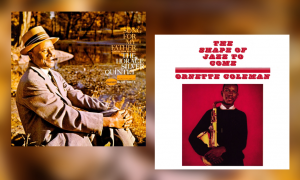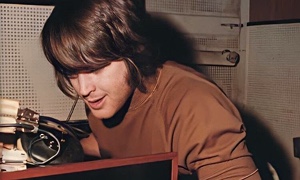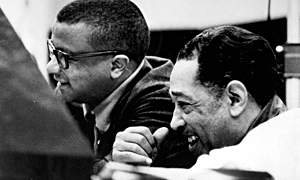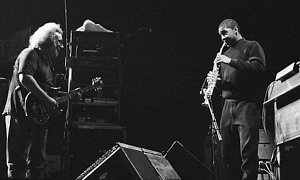Home » Jazz Articles » Building a Jazz Library » Charles Mingus: An Essential Top Ten Albums
Charles Mingus: An Essential Top Ten Albums

I am Charles Mingus, half black man, not even white enough to pass for nothing but black. I am Charles Mingus, a famed jazzman, but not famed enough to make a living in this society.
Mingus packed such an incendiary mixture of blistering and lyrical music into his career years 1945 to 1979 as to make many other musicians seem practically comatose. As a composer his peers included

Duke Ellington
piano1899 - 1974

Billy Strayhorn
piano1915 - 1967

Charlie Parker
saxophone, alto1920 - 1955
Mingus excelled at composing for both small and mid-sized ensembles, and like Ellington, he wrote and arranged with specific soloists in mind. He micro-managed the performance of his music in the recording studio and on the bandstand, unafraid to halt a piece midway and publicly berate a musician for failing to adhere to its spirit. He famously punched the trombonist

Jimmy Knepper
trombone1927 - 2003

Dannie Richmond
drums1935 - 1988
The best way to understand Mingus is to listen to his music, although much has been written by and about him. He wrote a lengthy and compelling autobiography, Beneath The Underdog: His World As Composed By Mingus (Alfred A. Knopf, 1971), in which he variously portrayed himself as a genius, a victim, a fighter, a moralist and a pimp, among other things. But the book raises as many questions as it provides answers, as do his biographies. Even Geoff Dyer, in his inspired collection of vignettes, But Beautiful (Jonathan Cape, 1991), possibly the greatest book ever written about jazz, in which Dyer seeks to inhabit the minds of eight icons including Mingus,

Bud Powell
piano1924 - 1966

Lester Young
saxophone1909 - 1959

Chet Baker
trumpet and vocals1929 - 1988
The ten albums which are listed below are by no means a definitive Mingus Top Ten, nor are they intended to be. But they are, indisputably, ten albums which deserve a place in any serious jazz library.
CHARLES MINGUS: AN ESSENTIAL TOP TEN ALBUMS
Unless noted otherwise, these albums are listed in the order they were recorded, not the order in which they were released. Pithecanthropus Erectus
Pithecanthropus ErectusAtlantic, 1956
Mingus' first blinder, the first of many. The band is completed by alto saxophonist

Jackie McLean
saxophone, alto1932 - 2006

J.R. Monterose
saxophone, tenor1927 - 1993

Mal Waldron
piano1925 - 2002

Willie Jones
drumsb.1929

Moondog
composer / conductor1916 - 1999
 Tijuana Moods
Tijuana MoodsRCA, 1962
Recorded 1957
History also does not record why this album, which vividly evokes the titular anything-goes border town without ever being touristic or literalist, sat on the shelf for five years awaiting release. When it finally came out, Mingus declared "This is the best record I ever made." Dannie Richmond has replaced Willie Jones and it is all change for the rest of the band, too. Jimmy Knepper is on trombone,
Shafi Hadi
b.1929Clarence Shaw
b.1926
Frankie Dunlop
drums1928 - 2014
 Mingus Ah Um
Mingus Ah UmColumbia, 1959
Masterpiece number three. A nine-track collection of mostly short-form pieces, Mingus Ah Um was conceived by Mingus as a celebration of the African American musical tradition. Among the musicians and genres evoked are Ellington ("Open Letter To Duke"),

Jelly Roll Morton
piano1890 - 1941

John Handy
saxophoneb.1933

Booker Ervin
saxophone, tenor1930 - 1970
Willie Dennis
b.1926
Horace Parlan
piano1931 - 2017
 Blues & Roots
Blues & RootsAtlantic, 1960
Recorded with much the same lineup as Mingus Ah Um, augmented by baritone saxophonist

Pepper Adams
saxophone, baritone1930 - 1986
 Charles Mingus Presents Charles Mingus
Charles Mingus Presents Charles MingusCandid, 1961
Another stone masterpiece, on Charles Mingus Presents Charles Mingus, Mingus leads a quartet on four long-form originals. The horn players are alto saxophonist and bass clarinetist

Eric Dolphy
woodwinds1928 - 1964

Ted Curson
trumpet1935 - 2012

John Coltrane
saxophone1926 - 1967
 Oh Yeah
Oh YeahAtlantic, 1962
On Oh Yeah, Mingus handed over the bass to

Doug Watkins
bass1934 - 1962

Rahsaan Roland Kirk
woodwinds1935 - 1977
 The Black Saint And The Sinner Lady
The Black Saint And The Sinner LadyImpulse, 1963
The liner note for The Black Saint And The Sinner Lady was written by Mingus' psychiatrist, Edmund Pollock. Initially reluctant when Mingus made the request, doubting his ability to write usefully about music, Pollock sensibly focused on Mingus himself. Performed by an eleven-piece ensemble in which the searing contributions of alto saxophonist

Charlie Mariano
saxophone, alto1923 - 2009
 Changes One
Changes OneAtlantic, 1975
Mingus released little newly recorded studio work between the Impulse albums and the mid 1970s, and the next major milestones are the Atlantic albums Changes One and Changes Two, recorded at the same sessions in late December 1974. The band is a corker, absolutely as good as any Mingus put together in the late 1950s and 1960s, but often overlooked because of a mistaken perception that he was past his peak by the mid 1970s. The lineup is Mingus and Dannie Richmond, trumpeter

Jack Walrath
trumpetb.1946

Don Pullen
piano1941 - 1995
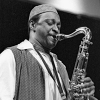
George Adams
saxophone, tenorb.1940
 @ Bremen 1964 & 1975
@ Bremen 1964 & 1975Sunnyside, 2020
Recorded 1964 and 1975
This 4 x CD set, originally recorded by West German radio for broadcasts in 1964 and 1975 and made available on disc for the first time in 2020, makes a strong claim to be Mingus' best live album. The performances are more abandoned and intense than on either Mingus At Antibes (Atlantic, 1960) or Town Hall Concert (Jazz Workshop, 1964) or Live At Carnegie Hall (Atlantic, 1974), great though all three of those recordings are. Discs one and two, recorded in April 1964, were made by a sextet including Eric Dolphy, tenor saxophonist

Clifford Jordan
saxophone, tenor1931 - 1993

Jaki Byard
piano1922 - 1999
 Three Or Four Shades Of Blues
Three Or Four Shades Of BluesAtlantic, 1977
This Top Ten started out with a masterpiece followed by an album which Mingus himself regarded as one of his best and then listed seven more undisputed winners. This tenth and final disc Mingus pretty much disowned on its release. Three Or Four Shades Of Blues was an unapologetic attempt by Atlantic to broaden Mingus' following to include the FM rock audience: the lineup includes three guitarists with jazz-rock sensibilities (
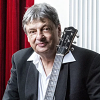
Philip Catherine
guitarb.1942

Larry Coryell
guitar1943 - 2017

John Scofield
guitarb.1951
Tags
Comments
PREVIOUS / NEXT
Support All About Jazz
 All About Jazz has been a pillar of jazz since 1995, championing it as an art form and, more importantly, supporting the musicians who make it. Our enduring commitment has made "AAJ" one of the most culturally important websites of its kind, read by hundreds of thousands of fans, musicians and industry figures every month.
All About Jazz has been a pillar of jazz since 1995, championing it as an art form and, more importantly, supporting the musicians who make it. Our enduring commitment has made "AAJ" one of the most culturally important websites of its kind, read by hundreds of thousands of fans, musicians and industry figures every month.






 Buy Now
Buy Now






